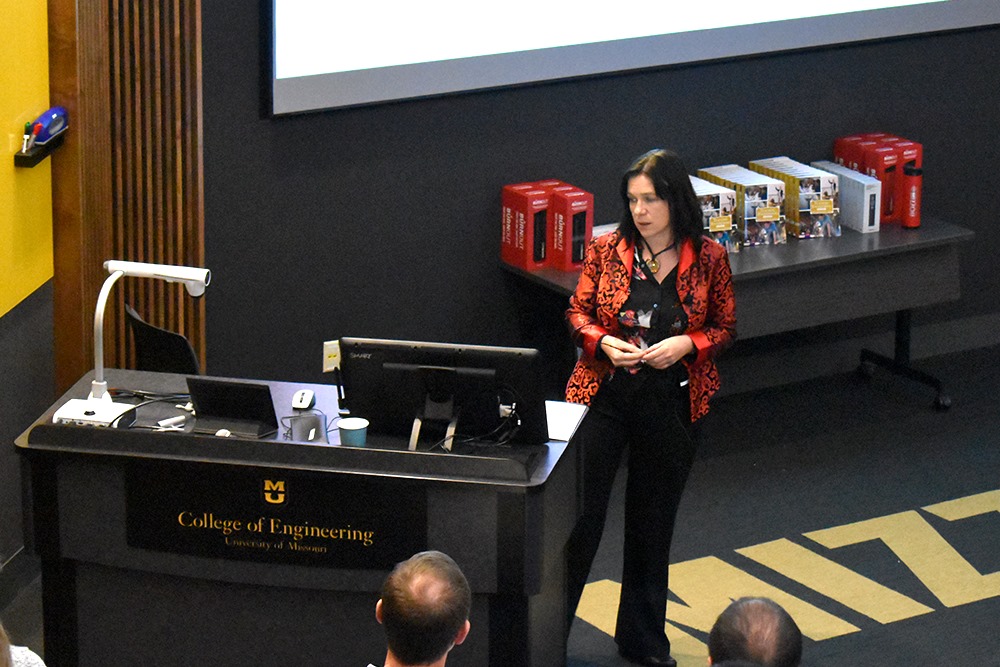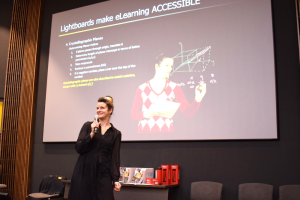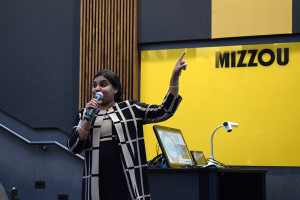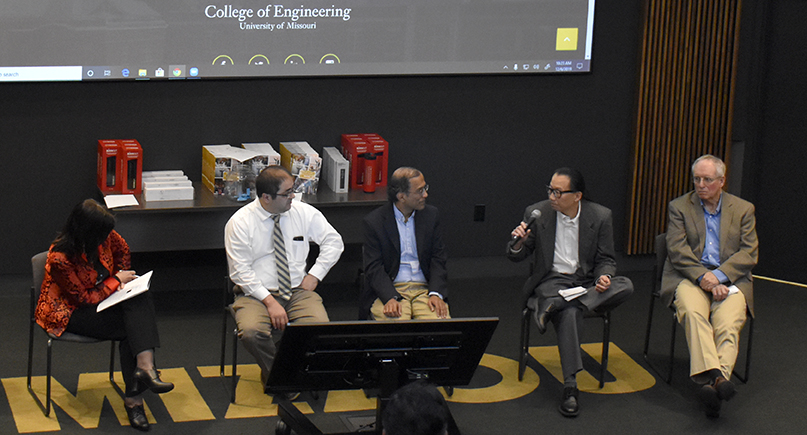December 12, 2019

Keynote speaker Jennifer M. Case discusses how to lecture with interactive methods that will help increase student engagement and understanding.
The Symposium on Engineering Teaching Excellence inspired the College of Engineering’s faculty with new teaching skills aimed at enhancing students’ educational experience.
The symposium was hosted by the Dean’s Council for Teaching Excellence (DCTE) Organizing Committee on Friday, Dec. 6, for the College’s professors to learn different approaches to facilitate engineering learning in the classroom. Roger Fales, the College’s Faculty Fellow for Academic Programs, worked closely with the council to organize the symposium and served as emcee for the event.
Keynote speaker Jennifer M. Case presented on how to lecture with interactive methods that will help increase student engagement and understanding.
Case is a professor and head of the Department of Engineering Education at Virginia Polytechnic Institute and State University as well as an honorary professor in the Department of Chemical Engineering at the University of Cape Town.
Her research focuses on how science and engineering students learn which has produced teaching methods proven to enhance the educational experience for engineering students.
Case wanted the College’s professors to re-evaluate their roles as teachers and examine which areas they can improve on for their students.
“As a teacher, you’re thinking about the students, you’re thinking about the subject and how to bring those together to make a student-subject relationship which is what you’re trying to influence,” she said.
The symposium also offered faculty the chance to discuss with their colleagues who’ve won the William T. Kemper Fellowship for Teaching Excellence how they foster advanced comprehension in their courses.
Hani Salim, the associate dean of Academic Programs and Student Success and a professor of Civil and Environmental Engineering, was awarded the fellowship in 2005.
Salim encouraged his colleagues to continue improving their curriculum and teaching style no matter their level of expertise.
“We have to find ways to keep students engaged,” he said. “You can be knowledgeable, an expert on the topic, but must think about your teaching.”
The most anticipated and animated part of the symposium was the 3 Minute Thesis presentations where nine engineering professors explained on a single PowerPoint slide what excites them about teaching.

BBCE Associate Prof. Heather Hunt advocated for professors to utilize the technology available to them like a lightboard for lecturing.
In under three minutes faculty are tasked with sharing the measurable benefits of their teaching methods to inspire their colleagues.
Heather Hunt, an associate professor of Biomedical, Biological & Chemical Engineering, had to take the engaging experience of her classroom and find a way to put it online.
In her thesis, she advocated for professors to utilize the technology available to them like a lightboard for lecturing. The see-through board allows lecturers to face the camera and film as their students follow along with their writing.
“This method takes the engaging ability that you have in class to slow down, to pace yourself, to really walk through an example,” she said. “Students will say things like, ‘I love your lightboard lectures. It feels like I’m right there with you. It feels like you’re in my living room, and I’m having a personalized experience.”
Kiruba Krishnaswamy, an assistant professor in the Department of Biomedical, Biological and Chemical Engineering and Food Science Program, shared her insight on how collaborative discussions facilitate breakthrough solutions in her course on hunger.

BBCE Assistant Prof. Kiruba Krishnaswamy shared her insight on how collaborative discussions facilitate breakthrough solutions in her course on hunger
“They have to work in groups to address the problems of zero hunger,” Krishnaswamy said. “And during these discussions, diversity of thought and different perspectives creates a collective peer mentorship towards the partnership of the goals because everything is connected.”
This was a common theme throughout the presentations: Team-based learning helps promote a positive environment for complex problem solving.
Marjorie Skubic, a professor of Electrical Engineering and Computer Science, adopted a studio-style method of teaching with longer classes focused on team-based projects.
“There’s a lot of opportunity for them to be very flexible and very creative in their formulation of the project,” she said. “The students get a lot of experience in design and implementation. There’s a lot of communication and teamwork, and the projects are very creative.”
Other College faculty who presented a 3 Minute Thesis included James Noble, Bin Wu, Robert O’Connell, Lydia Bentley (with the Teaching for Learning Center), Prasad Calyam and Sanjeev Khanna.

Keynote speaker Jennifer Case (left), listens to a discussion among recipients of the William T. Kemper Fellowship for Teaching Excellence: Associate Dean of Academic Programs and Student Success Hani Salim, EECS Prof. Kannappan Palaniappan, CEE Prof. Carlos Sun and EECS Prof. Emeritus Robert O’Connell.